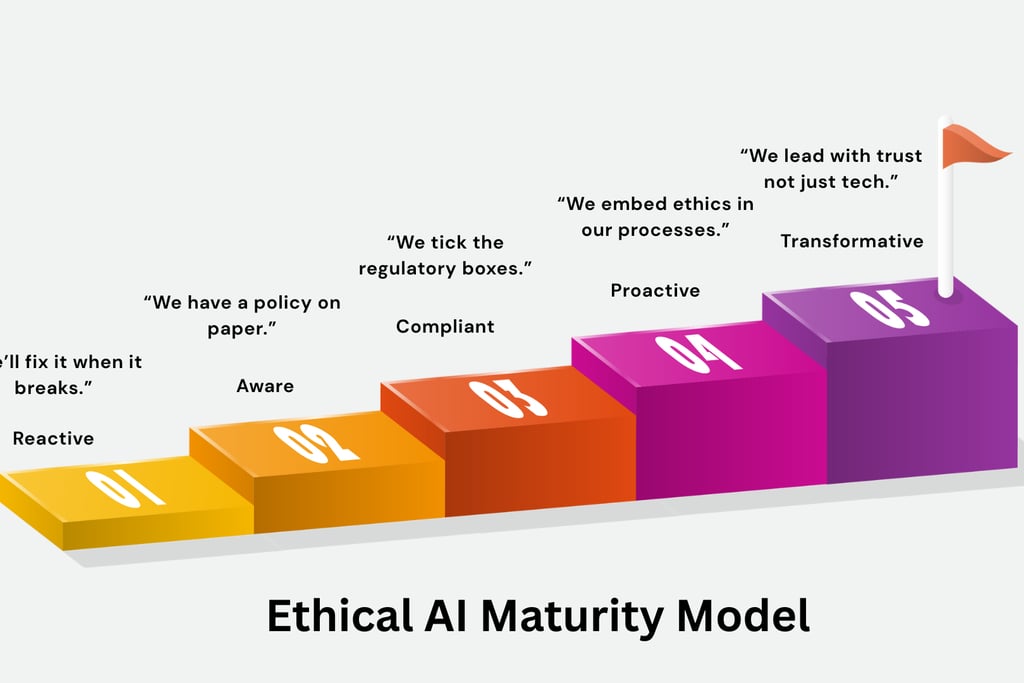“The Algorithm Decided — But Who’s Responsible?”
Discover why ethical AI is no longer a feature—it's the foundation. In this thought-provoking article, we explore how AI systems are increasingly shaping real-world decisions—from hiring and lending to news feeds and political profiling—often without accountability. The blog breaks down the 7 Pillars of Ethical AI, offers a practical Ethical AI Maturity Model, and provides 5 actionable strategies to start building responsible, human-centered AI today. If your organization is working with AI, this guide is essential for aligning innovation with trust, fairness, and long-term social impact.
DATA PRIVACY IN THE AGE OF AI
Nivarti Jayaram
6/16/20252 min read


"Ethical AI Is No Longer Optional — It’s the Architecture of Trust"
"We're not merely creating AI. We're creating the guidelines for who gets hired, assisted, and heard—and who doesn't. These days, AI is more than just data analysis. It's influencing choices, frequently in silence.
It determines whether you are granted a loan.
Resumes are shortlisted for a job you were unaware existed.
It implies what you see in the news and what your kids watch.
It even makes an effort to forecast your political inclinations, mood, and propensity to demonstrate.
However, we frequently hear, "The algorithm did it" when something goes wrong, such as when someone is profiled, rejected, or misjudged. That is no longer sufficient.
Because of this, ethical AI is not a "nice-to-have." It's a human necessity, a business necessity, and a compliance requirement. But first, let's define ethical AI.
The term "ethical AI" describes the creation, advancement, and application of systems that respect human rights and values, such as:
Fairness
Transparency
Privacy
Accountability
Robustness
Human Oversight
Environmental and Social Impact
“Ethics isn’t a feature. It’s the foundation.”
The 7 Pillars of Ethical AI
(Save or share this checklist)
Transparency — Systems must be explainable.
Fairness — No bias or discrimination
Privacy — Respect consent and data ownership.
Accountability — Someone must be answerable.
Human Oversight — Humans must stay in the loop.
Robustness — Secure, stable, resilient systems
Social Good — Does it help or harm the world?
Ethical Maturity: Where Does Your Org Stand?
Here’s a quick maturity scale. Where would you place your organization?
Want to lead your industry? Aim for Level 5.
5 Ways to Build Ethical AI (Starting Now)
Run Ethics Impact Assessments alongside privacy reviews
Form internal ethics boards with real power
Score every AI system against the 7 pillars
Train teams on bias, explainability, and consent
Publish transparency reports and invite external audit
“Ethical AI is how you scale trust — not just technology.”
Let’s Talk
Are ethics embedded into your AI pipeline — or looked at as an afterthought?
What does ethical maturity look like in your sector?
What’s one thing your team could do this quarter to move up the scale?
Drop your thoughts. Tag someone building AI. Start the conversation.
Because the future won’t just be built by code. It will be shaped by the conscience we build into it.


